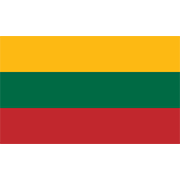Fiscal subject related
According to the above-mentioned order, the revised rules for filling out the form FR0445 for the request for a refund of value-added tax by a taxable person located outside the territory of the European Union regulate that a foreign taxable person can submit a request for a refund of VAT paid in the Republic of Lithuania only electronically. Other editorial changes were also made in the terms of changing the request for refund for a taxable person located outside the territory of the European Union.
The FR0446 form outlines the decision process for refunding value-added tax to a taxable entity situated outside the European Union's jurisdiction. It includes specific rules detailing the description of goods and services mentioned in the refund request submitted by a taxable person from another member state of the European Union. Furthermore, the guidelines provide clarity on the content of the refund request and the electronic submission of application appendices.
Additionally, the order set to take effect in 2024 introduces Model FR1084 and FR1085 forms. The FR1084 form pertains to the decision for reimbursing value-added tax to a taxable person in another European Union member state. On the other hand, the FR1085 form addresses the decision to refund recalculated value-added tax to a taxable person in another European Union member state, specifically after adjusting the value-added tax deduction percentage.
This comprehensive set of forms and regulations ensures a structured and standardized process for handling value-added tax refunds for taxable entities both within and outside the European Union
Other news from Lithuania
Lithuania’s 2026 Budget Raises Reduced VAT to 12% and Reforms Multiple Sector Rates from January 1, 2026
 Lithuania
Author: Nikolina Basić
Lithuania
Author: Nikolina Basić
Lithuania’s Parliament has adopted the 2026 Budget, introducing VAT rate changes effective 1 January 2026, including replacing the 9% reduced rate with a 12% rate for sectors such as accommodation, transport, culture, and catering, while the standard rate remains at 21%. At the same time, VAT on district heating, hot water, and firewood will increase to 21%, while VAT on medicines, books, and non... Read more



Lithuania Tightens VAT & Fiscalization Oversight: Stricter Inspections, Cash Register Rules, and Steeper Penalties Announced
 Lithuania
Author: Nikolina Basić
Lithuania
Author: Nikolina Basić
Lithuanian tax inspections for VAT and fiscalization can take place either at the tax administrator’s office or directly at the taxpayer’s premises, with prior notification required. During an inspection, officials may review all relevant accounting records, systems, and materials, while taxpayers must provide full access and necessary documentation. Read more
Subscribe to get access to the latest news, documents, webinars and educations.
Already subscriber? Login


Sweetened drinks tax starting January 2026 in Lithuania
 Lithuania
Author: Nikolina Basić
Lithuania
Author: Nikolina Basić
Lithuania will introduce a new excise tax on sweetened non-alcoholic beverages starting January 1, 2026, targeting drinks with added sugars or sweeteners while exempting those with only natural sugars. The measure, part of the 2026 tax reform, sets tiered rates up to €21 per hectolitre and is expected to slightly raise retail prices depending on sugar content and product type. The Lithuanian Parli... Read more



Lithuania updates VAT Law with new reduced rates and exemptions
 Lithuania
Author: Nikolina Basić
Lithuania
Author: Nikolina Basić
Lithuania has proposed amendments to its VAT law introducing a 12% reduced rate for accommodation, public transport, cultural visits, and household energy supplies. The draft also extends reduced VAT to printed and electronic books and educational publications, excluding those with mainly advertising, music, or video content Lithuania has amended its Value Added Tax (VAT) law to introduce new redu... Read more



New technical documentation in Lithuania
 Lithuania
Author: Ištvan Božoki
Lithuania
Author: Ištvan Božoki
The Lithuanian Tax Authority has released version 1.9 of its technical documentation, introducing clarifications to several web services, including updates to the description of “linkedDocumentNumber” and the error code CERTIFICATE_VALID_TOO_LONG. Changes also affect the validity descriptions of transport and security module certificates in the CSR file creation guide, with the full documentatio... Read more



Lithuania begins shift toward EU-compliant Structured E-Invoicing
 Lithuania
Author: Nikolina Basić
Lithuania
Author: Nikolina Basić
Lithuania plans to implement nationwide structured e-invoicing by 2028, using the EU standard EN 16931 and aligning with the 2030 VAT in the Digital Age reforms. The system will likely adopt a 5-corner model with real-time reporting to the SABIS platform, building on its existing eSąskaita B2G infrastructure and offering free API-based tools for businesses. Lithuania has set its sights on a full-s... Read more



New document was uploaded: EV-chargers from the Fiscalization Perspective in Lithuania
 Lithuania
Author: Nikolina Basić
Lithuania
Author: Nikolina Basić
The purpose of this document is to explain rules regarding the treatment of EV chargers for electric vehicles from a fiscalization perspective. We will explain whether EV chargers need to contain cash registers and other fiscal requirements or not, is it maybe part of the e-invoicing rules, or are they exempt from those obligations? Read more
Subscribe to get access to the latest news, documents, webinars and educations.
Already subscriber? Login

